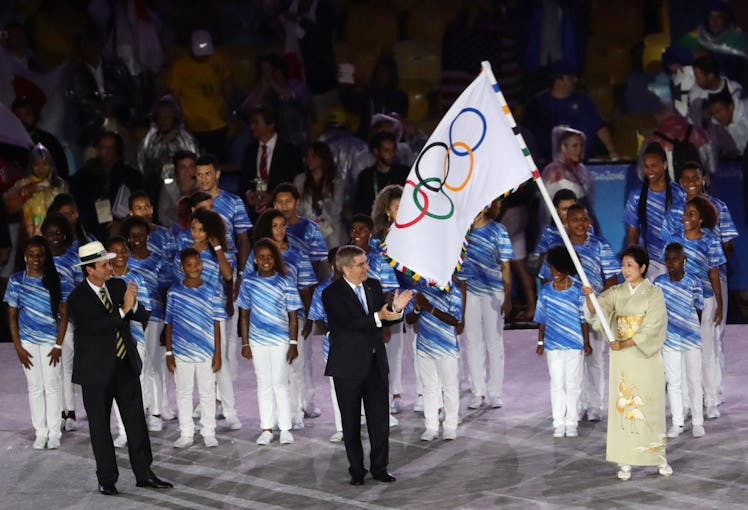
There's A Sweet Tradition For The Order Athletes Walk In The Olympics Closing Ceremony
It goes back more than 60 years.
On Sunday, Aug. 8, the Tokyo Summer Olympics are, sadly, coming to an end. To wrap up nearly three weeks of global unity through athletics, a closing ceremony will be held in Tokyo, featuring athletes that have stuck around for the event. The Olympic closing and opening ceremonies have a lot in common: both include dazzling performances, as well as an official march for all participating nations. However, there’s one big change: the order athletes walk in at the Olympics closing ceremony is different from the order they walk in for the opening ceremony, and it's for this one very sweet reason.
During the Parade of Nations at the Olympic opening ceremony, every country's athletes march into the stadium as a team, with the nation’s chosen flag bearers taking lead of the group. The first team to walk in is always Greece, since it was the birthplace of the Olympics and the first-ever host country for the modern Olympic Games in 1896. After Greece, the order of countries in the opening ceremony parade changes depending on who's hosting the Olympics. The national teams enter the stadium in alphabetical order based on the language of the host nation. (So in 2021, it was alphabetical in Japanese, and in 2024 it will be alphabetical in French for the Paris Games.)
Things change up for the closing ceremonies. Instead of walking in a specific, objective order, there actually is no order at all for the closing ceremony. Instead of a parade of nations, it's a parade of athletes. The official policy for the Tokyo 2020 opening and closing ceremonies explains athletes “walking en masse and in no particular order” is meant to “unite the athletes and spectators into one whole.”
This has been the case for the closing ceremony since the 1956 Olympics, which were held in Melbourne, Australia (yes, fans of The Crown, that’s the one Prince Philip opened). According to the official Olympics website, John Ian Wing, a Chinese apprentice carpenter who was living in Australia, suggested that all of the athletes from every nation walk together instead of being divided by country "as a symbol of world unity." Wing was just 17 years old at the time, according to the National Museum of Australia, and he wrote in his suggestion to the Olympic organizers.
Clearly, Wing made some good points. For over 60 years, Olympians have followed this new tradition in a demonstration of international togetherness. Wing was honored for his idea when the Australian Institute of Sport opened in 1986, per the National Museum of Australia.
The idea sums up what the Olympic Games are supposed to represent in the first place: Yes, it’s about competition, but it’s also about bringing the world together through sportsmanship.
After the athletes walk in all together, they get to hang out with whoever they want and watch the closing ceremony, which typically includes speeches and performances — just like the opening ceremony. The torch is also ceremonially passed along to the next Olympic host city, which will be Paris in 2024. Although the athletes walk en masse, there are still flags for every participating country. Just like with the opening ceremony, the person who carries the flag is specially chosen by their country as the representative. While it is certainly an honor, it's just one small part of the unifying ceremony that closes out the games.
In the wake of the ongoing COVID-19 pandemic, this year’s closing ceremony will be especially moving. This years’ Olympic Games have been controversial from the start for continuing despite worldwide protests: Japan’s vaccination rates are still relatively low, a state of emergency was declared in Tokyo just weeks before the events, and multiple athletes have tested positive for COVID-19. But even amid the turmoil and protests, athletes from all over the world will still come together to close out the games in a display of unity. So, while the closing ceremony for the Tokyo Summer Games will no doubt be a sight to see, here’s hoping the 2024 Paris Olympics will take place in a world where COVID-19 isn’t the elephant in the room.
This article was originally published on